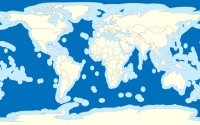South China Sea
Quicktabs: Keywords

China has nominated a candidate for a judge’s position in the International Tribunal for the Law of the Sea, a court that hears and settles maritime dispute. The U.S. opposed the idea and suggested that China shouldn’t be given a seat because it disregards international maritime law in the South China Sea.
[ More ]
The author argues that U.S. shows of force in the South China Seas through freedom of navigation operations are counterproductive and risk turning our allies against us. Instead the author argues a diplomatic approach would be more proportional and "seems to be sufficient for other nations, including maritime powers whose rights the U.S. claims to be protecting."
[ More ]
Top US and Chinese military commanders have signed a deal to improve communications between the two forces amid ongoing disputes in the South and East China seas.
[ More ]
A U.S. Navy destroyer carried out a "freedom of navigation operation" on Thursday, coming within 12 nautical miles of an artificial island built up by China in the South China Sea, U.S. officials told Reuters.
[ More ]
A senior U.S. naval commander insisted Thursday that American policy on the South China Sea has not shifted, despite uncertainty about President Trump’s response to Chinese militarization of the disputed waters.
[ More ]
The author advocates for a more muscular deterrent with China by stepping up its committment to freedom of navigation operations in the South China Sea to make U.S. resolve more apparent.
[ More ]
The US will not accept China's militarisation of man-made islands in the South China Sea, Defence Secretary James Mattis has warned.
[ More ]
The author defends calls to use Freedom of Navigation Operations to reinforce navigational rights in the South China Sea but argues that the "United States can go further to sharpen its messaging and win regional support, though, by publicizing more information on its freedom of navigation activities and by building a multilateral coalition that supports them."
[ More ]As bad as things are already, they could get worse—particularly if American attention and resolve are in question. In attempting to prevent China from using military force to resolve island and maritime claims disputes in the South China Sea, the United States will increasingly face Beijing’s three-pronged trident designed precisely to preserve such a possibility. Maritime militia and Coast Guard forces will be forward deployed, possibly enveloping disputed features as part of a “Cabbage Strategy”13 that dares the U.S. military to use force against non-military personnel. Such forces would be supported by a deterrent backstop that includes both China’s navy and its “anti-navy” of land-based anti-access/area denial (A2/AD), or “counter-intervention,” forces, collectively deploying the world’s largest arsenal of ballistic and cruise missiles. In the region, only Vietnam also has a maritime militia, and the U.S. Coast Guard is not positioned to oppose China’s. Meanwhile, China’s Coast Guard is already larger than those of all its neighbors combined, and still growing rapidly.14
The South China Sea is another area of heated contestation where UNCLOS serves as the guidepost for clarity. Of notable importance is the ruling from the South China Sea arbitration that UNCLOS comprehensively allocates rights to maritime areas thereby precluding historic claims like China’s “Nine-Dash Line.” From this principle, the arbitral tribunal systematically refuted China’s extensive claims and actions in the South China Sea beyond the treaty’s carefully crafted limitations. In the view of Washington, these limitations include undue attempts to curtail the freedoms of navigation and overflight in exclusive economic zones (EEZs). Notably, China takes an opposing view and asserts the ability to prohibit foreign military operations in its claimed EEZs. Thus, although the United States remains neutral on competing claims in the South China Sea, Washington has a compelling national security interest in upholding the substance of the arbitral tribunal’s ruling.
Like U.S. claims in the Arctic, the United States’ legal rights in the South China Sea are not academic. As reported by Ronald O’Rourke, a U.S. naval affairs analyst, the EEZ legal dispute between Washington and Beijing has led to significant confrontations between Chinese and U.S. ships and aircraft in and above international waters. For example, in August 2014, a Chinese J-11 fighter dangerously intercepted a U.S. P-8A Poseidon, a naval reconnaissance aircraft, operating in the South China Sea approximately 117 nautical miles east of Hainan Island. Thanks to the arbitral tribunal’s artful debunking of the nature of Chinese-claimed maritime features and related entitlements, there is greater legal clarity on U.S. operational rights in the South China Sea. By formally joining UNCLOS, the United States will be in a stronger position to support the ruling of the arbitral tribunal in the face of Chinese opposition.
Following the award in the matter of the South China Sea, is the U.S. better ratifying UNCLOS? Yes. While the U.S. has maintained that most UNCLOS is customary international law and as such has followed it, the U.S. is failing to take advantage of the provisions relating to the continental shelf. Also, they are losing out on an important dispute resolution tool. While the U.S. enjoys strong relationships with most arctic states, Russia is a notable exception. Russia has been increasingly aggressive worldwide, but they have no history of violating the law of the sea. By not acceding to UNCLOS, the U.S. has removed itself from the body of international law Russia seems to respect.
